
While in Los Angeles, I spent a lot of time sitting in traffic. Directly related to this, I spent a lot of time sitting in traffic listening to audiobooks. At one point, I got frustrated with the insanely slooooow pace at which most book are narrated that I started listening to audiobooks at double speed. The shift is disorienting at first, listening to a reader spin manically into hyper-speed. The thing is, I can only (easily) do that with books I download from Audible. CDs checked out from the library and MP3s I download have to go through a lengthy process to be considered “books” by my iPhone and are treated like music files, which is where things get interesting …
See, for a long time I resisted the shift from listening to an album to listening to individual tracks. But somewhere in the early 2000s I caved and my iPod is now filled with a rotating repertoire of evolving playlists created for specific times, moods, and places:

The success of these playlists is contingent on the iPod’s shuffle function:

Each playlist preserves a feeling, but never the exact same experience.
The thing is, if I switched from listening to a playlist to an audiobook, I would often forget to turn off the shuffle button. For books that are downloaded in Audiobook, again this can’t happen and even if it did it wouldn’t matter as much. Take for example a couple of YA books I purchased on Audible:


Each of these is a relatively short book and is downloaded (and consumed) as a single file. Rats Saw God is a solid uninterrupted 6 hour and 24 minute listen (or, if you’re like me, a 3 hour and 12 minute listen).
Even if you wanted to shuffle these books, you couldn’t. They are single files. It would be like creating a playlist with one song and hitting shuffle:
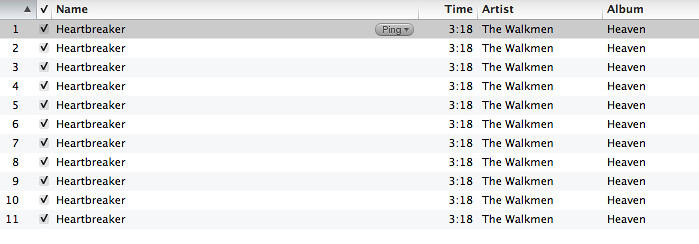
A Feast for Crows, a much longer book (topping out just under 38/19 hours of listening time) is downloaded as four separate files. You could shuffle these 8 hour tracks, but the narrative will have progressed so far ahead that it will become immediately obvious when the four chunks are not played in the correct order.
However, let’s take a CD or MP3 example. I bought a (DRM-free!) copy of Doctorow’s For The Win sometime last year. It is downloaded as a series of MP3s that can be easily burned to 13 discs. That’s a lot of MP3s:

If I don’t import these into a playlist in the correct order the 3 or 5 minute files will play in a haphazard fashion, creating a new narrative line not intended by the author.
And this is what I’ve been thinking about: the shift in narrative as a result of audio shuffle. Though time is cyclical for me (It’s morning then night and I eat breakfast and then lunch and then dinner and go to sleep), the ways I perceive and work throughout the day are anything but (I open Word to start writing and then get a cup of coffee and check my phone and write a paragraph and read a chapter of a book and then delete that paragraph and write a title for the Word document and yell at the dog for barking and then add a new sentence and then put on some music which reminds me to see if Martha Wainwright has a new album anytime soon-she does not-and then I start chatting with a friend online … and eventually write something of substance in the Word file).
Some novels incorporate the chance-element of shuffle into their structure. But they’re usually experimental and unfulfilling as traditional narratives. B.S. Johnson’s The Unfortunates gets close. It’s a series of pamphlets that are shuffled together to create a new novel for each reading:
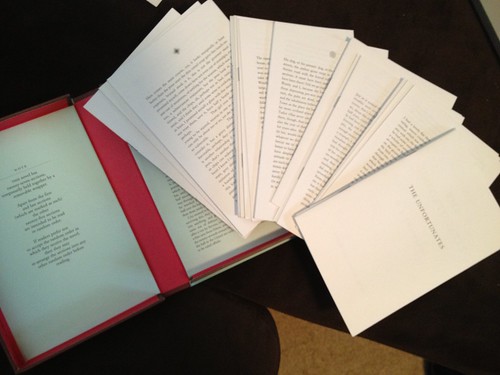
Cortazar’s Hopscotch supposedly works in random-ish order.
I think a more controlled chaos could also work. I think of the three parts of Skippy Dies and, considering Paul Murray tells you exactly what happens by the end of the book in the title, wonder how my experience would be altered if I shuffled the three parts of the books. Ditto the five parts (and three bound volumes) of Bolano’s 2666.
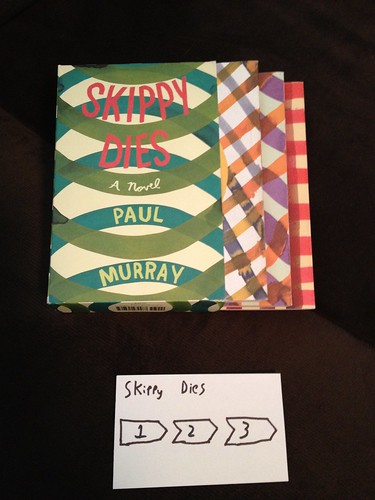
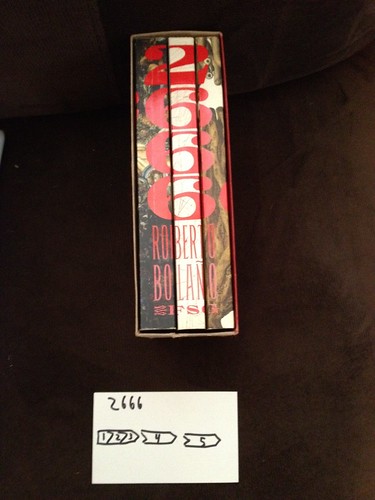
I think of Deleuze and Guittari’s notion of the rhizome. A model for looking at research and culture, the notion of the rhizome differs significantly from traditional tree-like hierarchies. Seeing multiple points of entry and exploration, they write that “any point of a rhizome can be connected to anything other, and must be.” The world is shuffled. We curate rhizomatic experience everytime we create a playlist – a digital piñata of randomly falling sonic riches.
What would happen if I were able to curate my reading library and create a playlist?
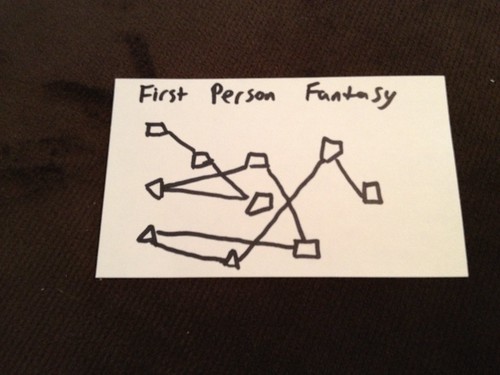
“Today I feel like reading a Murakami playlist-not an anthology-but a new Murakami narrative shuffled only for me” or “I’m going to cozy up with a read-list of contemporary Russian authors in translation.” Or “You know, I feel like a discordant mix of John Ashberry and Shel Silverstein.”
Music products are being produced in this way now:

The latest release from Nicholas Jaar (on the right) is a cube of music with two headphone inputs. Listeners are subjected randomly to the tracks stored in the device’s memory. Pragmatically, I won’t know which song is up next or even what it may be called.
A rhizomatic listening experience is one that can be parsed every which way. Purists (myself included) would argue that this is a bastardization of the art form. “Hendrix wanted you to listen all the way through, man.” And they/we’re right. But it seems like print culture can by shuffled in ways to create new narratives budding from the old.
From friend on Facebook: After reading through your whole blog, I see you referenced Deleuze and Guattari and even hyper-linked out to A Thousand Plateaus. Having that introduction handy and printable is nice though, I suppose. I was working one day, pruning trees actually, and was listening to Three Cups of Tea. Something got shuffled, but I didn’t realize it for some time. The narrative just seamlessly blended. I was confused, yet still understood what was happening (I still always flip back through an alphabetic text when my ears don’t catch everything). I just finished One Hundred Years of Solitude, not as an audiobook… as a glue-bound… I wonder though, with one of the claims in that being that all is memory, all is forgotten (at least as I interpret it to some degree), I wonder how that text would be as a shuffled audiobook. The narrative is so magically sewn together, where one generation on some level repeats what the generation before it did, the names are the same, etc. It would either open up a world of confusion or another layer of Marquez magic…